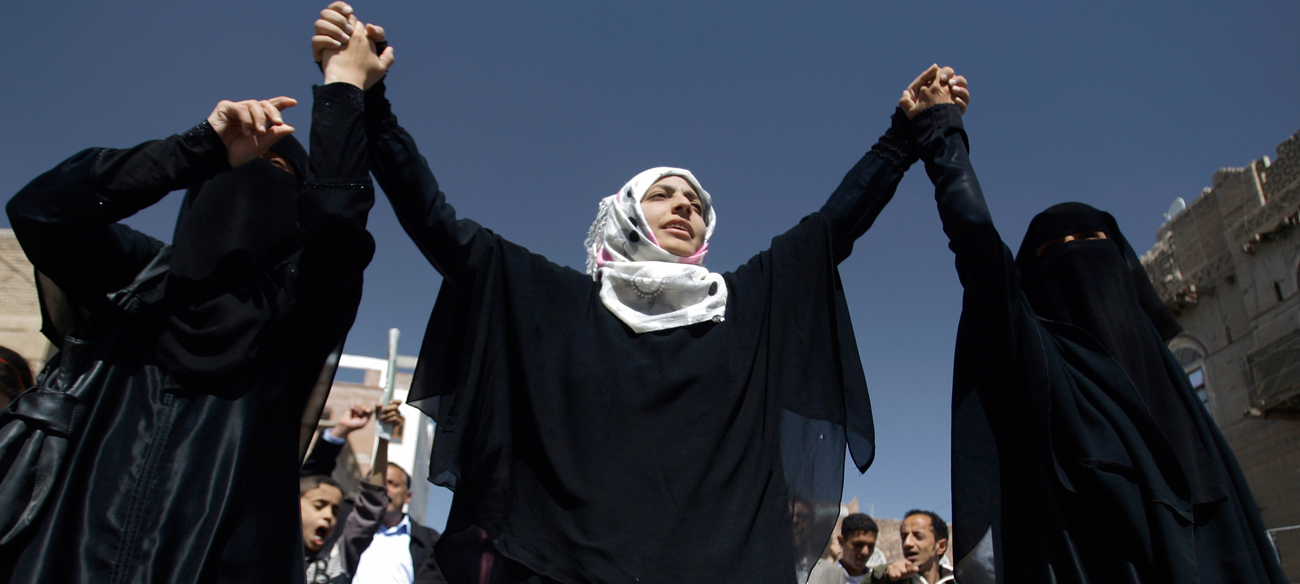Middle East and North Africa
Across the Middle East and North Africa, Inclusive Peace supports inclusive process design and undertakes strategy work with women’s groups to increase their influence in peacemaking efforts. We also facilitate networking and exchanges between different actors and work on research policy and research-practice transfer.
Our peace process support work in the MENA region covers four main categories of activity: inclusive process design; strategy work with women’s groups to promote women’s influence; facilitating peer exchange and networking; and research-policy and research-practice transfer.
We have provided advice and input on inclusive process design in Syria, Yemen, and Libya, focusing particularly on how to ensure the meaningful participation and influence of women and civil society. As well as providing general advice on inclusion structures and mechanisms, this work has revolved around “rethinking” peace process design and implementation given the complexities of the region’s contexts.
For example, our work in Yemen, where we are part of an EU-supported consortium together with the Berghof Foundation, Yemen Policy Centre, and DCAF, has involved undertaking comparative research in relation to civil society engagement in local ceasefires, including ways in which local ceasefires can build peace from the local level. This is particularly relevant in the Yemen context, given the challenges around advancing the formal negotiation processes, including those under the auspices of the UN.
In collaboration with UN Women, Inclusive Peace has been actively involved In the “Enhancing Women’s Leadership for Sustainable Peace in Fragile Contexts in the MENA Region” project over the past two years. Within this framework, Inclusive Peace has been working on an overarching body of research exploring how to make peace and political transition processes more meaningfully inclusive and gender-responsive, and how this, in turn, can increase the likelihood that these processes give rise to sustainable inclusive outcomes. This research has informed our agenda-setting work and process accompaniment support with women peacebuilders. It has given rise to a series of publications: a research report, a policy brief, and four research papers.
We have also worked directly with women negotiators, advisors, and peacebuilders throughout the region, providing guidance to women representatives taking part in track I processes and helping women peacebuilders to develop options for women’s influence in different potential political settings. Working with this range of actors across the region has allowed us both to draw on and further enhance our extensive knowledge base regarding the different roles of women in peacemaking and peacebuilding efforts and how these can be leveraged to increase their influence. We helped to integrate these lessons into the UN Secretary General’s report on Women, Peace, and Security (WPS) in 2018.
Report,
Transfer from Track Two Peacebuilding to Track One Peacemaking: A Focus on Yemen and Syria
This report shares new insights about transfer from track two to track one in Yemen and Syria, and provides a framework that all actors and funders can use to assess and plan for effective transfer.
May 2023Kaitlyn Hashem, Thania Paffenholz,
Policy Paper,
Transfer from Track Two Peacebuilding to Track One Peacemaking: Insights from Yemen and Syria
This policy brief presents findings from a study that explored the process of transfer from informal peacebuilding initiatives (track two) to formal peacemaking processes (track one) in the context of the intra-state wars in Yemen and Syria, including a specific focus on the role of women therein.
May 2023Alexander Bramble,
Report,
A Practical Guide to a Gender-Inclusive National Dialogue
This guide is intended to be a practical resource for anyone preparing, advocating for, or participating in an upcoming or ongoing national dialogue, and it seeks to foster understanding of how to make a national dialogue truly inclusive of women and gender.
May 2023Nick Ross,
Report,
Using Temporary Special Measures for Inclusive Processes and Outcomes
This paper explores the capacity of TSMs to render peace negotiation processes more gender inclusive and to promote political, economic, and social gender equality in the post-agreement phase.
May 2023Philip Poppelreuter, Nick Ross, Alexander Bramble,
Report,
Reaching an Inclusive Truce: Gendering Ceasefires
This paper serves as a guide to gender-responsive ceasefire agreements. It explores strategies to enhance women’s influence over ceasefire negotiations and provides both language and an approach to render ceasefire texts and their constituent provisions more gender responsive.
May 2023Kaitlyn Hashem, Alexander Bramble,


